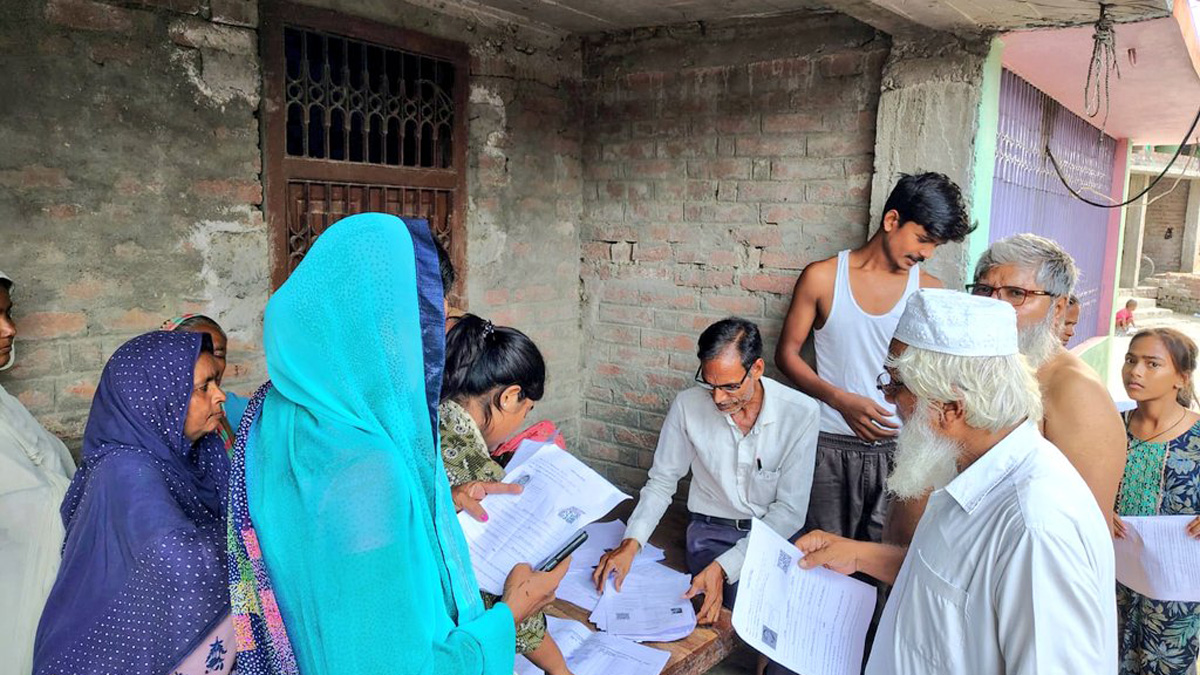Supreme Court keeps faith in ECI; seeks transparency in Bihar electoral roll revision
 (File) A BLO collecting documents as part of Bihar SIR in Vaishali district, Bihar
(File) A BLO collecting documents as part of Bihar SIR in Vaishali district, Bihar
The Supreme Court, on Wednesday, struck a delicate balance between deference and oversight as it heard the challenge to the Special Intensive Revision (SIR) of Bihar’s electoral rolls. The top court, while refusing to stay the process, reminded the Election Commission of India (ECI) that it is already aware of its constitutional responsibility and must ensure transparency, fairness, and due process.
The observation came during the hearing of a series of petitions filed by the Association for Democratic Reforms (ADR) and other civil society groups alleging that the ECI’s ongoing SIR exercise has led to the arbitrary deletion of over 65 lakh names from Bihar’s voter list, potentially disenfranchising thousands of genuine voters ahead of the 2025 assembly elections.
Court’s caution
A bench led by Justice Surya Kant and Justice Joymalya Bagchi said it would not interdict the Commission’s powers under Article 324 of the Constitution. “We trust the Election Commission to discharge its duties with fairness,” the judges observed, adding, “It already knows what its responsibilities are under the law.”
The court’s tone was one of constitutional caution, recognising the ECI’s autonomy but signalling that the exercise must strictly comply with the Representation of the People Act, 1950, and the Registration of Electors Rules, 1960.
In previous hearings, the apex court had directed the Commission to publish district-wise data of deletions, specifying whether names were removed due to death, migration, or duplication. It also asked the ECI to accept Aadhaar as an identity proof (though not as proof of citizenship), and to provide free legal aid to nearly 3.77 lakh voters who had been excluded from the draft list.
Petitioners cry foul
Petitioners have called the SIR "an exercise in disenfranchisement.” They claim that the verification process was opaque and discriminatory, excluding widely accepted documents like Aadhaar, ration cards, and voter ID cards, and giving citizens barely a few days to prove eligibility. The petitioners also allege that marginalised and migrant communities have been hit the hardest, as they are least equipped to provide the limited set of acceptable proofs.
ECI hits back with affidavit
The Election Commission, in its affidavit, has mounted an aggressive defence. Labelling the claims of the petitioners as false and misleading, the ECI accused them of trying to derail a lawful electoral process through unverified data and selective interpretation.
In a ten-point rebuttal filed before the apex court, the ECI argued:
The petitioners’ figures were based on newspaper reports and self-made charts, not official data.
The alleged mass deletion was the result of routine corrections, removing deceased voters, duplicates, and migrated individuals.
No voter was removed without a notice, hearing, and a speaking order by the Electoral Registration Officer.
The database does not capture religion, and thus, allegations of disproportionate exclusion of any community were communal and unfounded.
Translation errors that led to gibberish names in some lists were software glitches that did not affect eligibility.
Where no formal house number existed, notional numbers were used to ensure every voter could be uniquely identified.
The ECI maintained that the SIR has strengthened, not weakened, electoral integrity. “The purpose of the exercise was to purify rolls, not to exclude eligible voters,” it said. “The petitioners’ intention appears to be to stall the process not just in Bihar, but across India.”
The Commission further pointed out that of Bihar’s 7.89 crore registered voters, 7.24 crore had submitted their forms during the SIR process. Of the remaining, it said, 22 lakh were deceased, 36 lakh had migrated, and 7 lakh were enrolled elsewhere.
The top court acknowledged the ECI’s constitutional status but reminded it of its duty to protect the right to vote, which, though statutory in form, stems from democratic principles embedded in the Constitution.
The top court said it expects the Election Commission to look into typographical errors and other mistakes in the final electoral roll prepared after the SIR as a responsible authority and come out with remedial measures. The court will now hear on November 4 the legal issues pertaining to the Bihar SIR exercise.
India